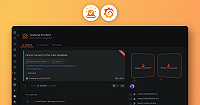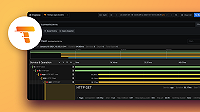Caution
Grafana Alloy is the new name for our distribution of the OTel collector. Grafana Agent has been deprecated and is in Long-Term Support (LTS) through October 31, 2025. Grafana Agent will reach an End-of-Life (EOL) on November 1, 2025. Read more about why we recommend migrating to Grafana Alloy.
Important: This documentation is about an older version. It's relevant only to the release noted, many of the features and functions have been updated or replaced. Please view the current version.
Grafana Agent
Overview
Grafana Agent collects and forwards telemetry data to open source deployments of the Grafana Stack, Grafana Cloud, or Grafana Enterprise, where your data can then be analyzed. You can install Grafana Agent on Kubernetes and Docker, or as a system process for Linux, macOS, and Windows machines.
Grafana Agent is open source and its source code is available on GitHub at https://github.com/grafana/agent.
Grafana Agent is for engineers, operators, or administrators who want to collect and forward telemetry data for analysis and on-call alerting. Those operating Grafana Agent must install and configure Grafana Agent to properly collect telemetry data and monitor the health of running agents.
Why use Grafana Agent?
There are other ways of sending metrics, logs and traces to the Grafana Stack, Grafana Cloud or Grafana Enterprise, but there are a few advantages of using Grafana Agent. These features are outlined below.
- Provides a one-stop solution for collecting metrics, logs, and traces.
- Collects out-of-the-box telemetry from popular projects like MySQL through integrations.
- Works seamlessly with the Grafana Stack. Alternatively, metrics can be sent to any Prometheus-compatible endpoint, and traces can be sent to any OTLP-compatible endpoint.
- Offers new solutions to help scale metrics collection like host_filtering and sharding.
- Provides the Grafana Agent Operator, which enables individual teams to manage their configurations through PodMonitors, ServiceMonitors, and Probes.
Metrics
Grafana Agent focuses metrics support around Prometheus’ remote_write protocol,
so some Prometheus features, such as querying, local storage, recording rules,
and alerts are not present. remote_write, service discovery, and relabeling
rules are included.
Grafana Agent has a concept of an “instance” each of which acts as
its own mini Prometheus agent with its own scrape_configs section and
remote_write rules. More than one instance is useful when you want to have
separate configurations that write to two different locations without
needing to consider advanced metric relabeling rules. Multiple instances also
come into play for the Scraping Service Mode.
Grafana Agent for collecting metrics can be deployed in three modes:
- Prometheus
remote_writedrop-in - Host Filtering mode
- Scraping Service mode
Prometheus remote_write drop-in
The default deployment mode of Grafana Agent is a drop-in replacement for
Prometheus remote_write. Grafana Agent acts similarly to a single-process
Prometheus, doing service discovery, scraping, and remote writing.
Host filtering
Host filtering configures agents to scrape targets that are running on the same machine as the Grafana Agent process.
- Gets the hostname of the agent by the
HOSTNAMEenvironment variable or through the default. - Checks if the hostname of the agent matches the label value for
__address__service-discovery-specific node labels against the discovered target.
If the filter passes, the target is scraped. Otherwise, the target is ignored and not scraped.
To use Host Filtering mode, you set a host_filter flag on a specific
instance inside the Agent’s configuration file. When you set this flag, the
instance only scrapes metrics from targets that are running on the same
machine. This is useful for migrating to sharded
Prometheus instances in a Kubernetes cluster, where the Agent can be deployed as
a DaemonSet and distribute memory requirements across multiple nodes.
Note that Host Filtering mode and sharding your instances means that if an Agent’s metrics are being sent to an alerting system, alerts for that Agent might not be able to be generated if the entire node has problems. This changes the semantics of failure detection, and alerts would have to be configured to catch agents not reporting in.
For more information on the host filtering mode, refer to the operation guide.
Scraping service
Scraping Service Mode clusters a subset of agents. It acts as a go-between
for the drop-in mode (which does no automatic sharding) and host_filter mode
(which forces sharding by node). The Scraping Service Mode clusters a set of
agents with a set of shared configurations and distributes the scrape load
automatically between them. For more information on Scraping Service, see
Scraping Service.
Logs
Grafana Agent supports collecting logs and sending them to Loki using its
loki subsystem. This is done using the upstream
Promtail client,
which is the official first-party log collection client created by the Loki
developer team.
Traces
Grafana Agent collects traces and forwards them to Tempo using its
traces subsystem. This is done using the upstream OpenTelemetry Collector.
Grafana Agent can ingest OpenTelemetry, OpenCensus, Jaeger, Zipkin, or Kafka spans.
For more information on how to configure, refer to receivers.
The Grafana Agent is also capable of exporting to any OpenTelemetry GRPC compatible system.
Supported platforms
- Linux
- Minimum version: kernel 2.6.32 or later
- Architectures: AMD64, ARM64, ARMv6, ARMv7
- Windows
- Minimum version: Windows Server 2012 or later, or Windows 10 or later.
- Architectures: AMD64
- macOS
- Minimum version: macOS 10.13 or later
- Architectures: AMD64 (Intel), ARM64 (Apple Silicon)
- FreeBSD
- Minimum version: FreeBSD 10 or later
- Architectures: AMD64
Release schedule
Starting with the v0.28 release, a new minor release is planned for every 6
weeks. This includes a release for Grafana Agent, Grafana Agent Operator, and
the agentctl binary.
The release schedule is best-effort, and releases may be moved forward or backwards if needed. The planned release dates for future minor releases are not changed if one minor release is moved.
Patch and security releases may be created at any time.
Was this page helpful?
Related resources from Grafana Labs



